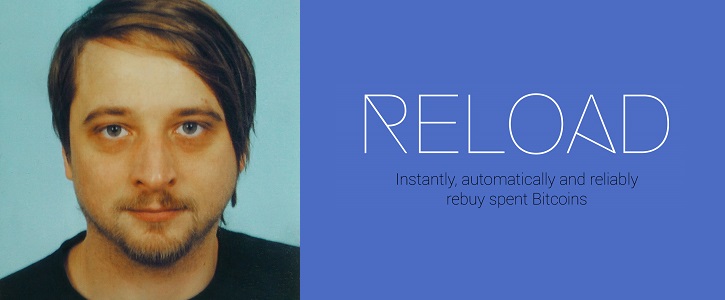Bitnik Reload is a new service that not only refills your wallet with bitcoin but also acts like a ‘reverse BitPay’ in a way. Specifically for consumers, the service facilitates hedging against price volatility as fiat is converted into bitcoin on the spot.
Cointelegraph spoke with Bitnik co-founder Peter Trcek on the new product, why it can be extremely useful for BTM operators and business owners and how it may play into the Internet of Things in the future.
“For the casual user, the service is mostly used as a ‘rebuy on-the-fly’ solution.”
- Bitnik co-founder, Peter Trcek
Cointelegraph: What does Bitnik Reload do and how does it work?
Peter Trcek: Reload offers automation for Bitcoin resellers and everyday Bitcoin users. Bitcoin is used as a transfer mechanism, while the users effectively spend fiat amounts at exact current market bitcoin prices. This is very important as bitcoin price is quite volatile.
CT: Why might this be useful and what major problems does this solve?
PT: All successful bitcoin resellers know that it is vital to hedge against bitcoin price volatility. This means that with every bitcoin sale they need to instantly re-buy the same amount with a bitcoin liquidity provider. Reload is tailored for this case and automates the process. BTM operators can register their wallet address directly while for LocalBitocoins OTC resellers Reload offers direct integration.
For the casual user, the service is mostly used as a “rebuy on-the-fly” solution. The user can go about spending bitcoins wherever they are accepted and when he chooses to - he can use Reload to actually spend fiat. Imagine trying to cash in on the emerging bitcoin discounts only to find out that there were no savings when bitcoin price changes.
I personally use bitcoins to pay all my utility bills. Services offering this are cheaper than using my bank and the process is much simpler. With Reload I know I'm not overpaying for those spent bitcoins.

CT: Where are the private keys stored?
PT: Storing Bitcoin private keys can be always a challenge and a possible risk. Reload never holds users' bitcoins. That responsibility remains with user and liquidity provider.
CT: How long does the user have to wait to receive funds?
PT: Reload acts within seconds. As soon as we are notified about the transaction on the network, the automation is triggered. Funds are immediately available for the user and he is in full control of them.
“Reload […] is not vendor-biased, which means the user will be able to use any wallet with any liquidity provider.”
CT: How does this compare to Coinbase's auto refill service?
PT: Coinbase's auto refill service is great feature for personal use. Reload however is not vendor-biased, which means the user will be able to use any wallet with any liquidity provider. That's the big and very important difference.
CT: Who are your competitors and what is unique about your service by comparison?
PT: Above mentioned Coinbase's feature is the only direct competitor currently, but as mentioned their service is limited to Coinbase wallet and liquidity provider.
There are other similar services that do not offer automation that is key to our product. They offer tools where users can import Bitcoin wallets' and liquidity providers' transactional data to be used for accounting and tax reporting. While this data is natively available to Reload and we obviously offer same capabilities, we do not consider it the main feature.
The kind of automation Reload is doing could be implemented by either wallets or liquidity providers themselves (i.e. Coinbase's auto refill). But those solution would always be vendor-biased (only available for one wallet or liquidity provider), while Reload is not.
“Our service is available worldwide with no limitations […] Reload users can remain anonymous.”
CT: Where does Reload stand in terms of regulatory compliance, KYC and AML requirements, etc.?
PT: Reload as a service never holds users' bitcoins. It utilizes other services (wallets, liquidity providers, etc.) and offers a way to connect them. Therefore, there are no KYC and AML requirements we need to follow. Our service is available worldwide with no limitations. Also for this reason, Reload users can remain anonymous, which is a valuable reassurance as not even Reload can link data to identity.
At Reload, we understand that certain (AML) regulation of bitcoin is necessary. We are glad we don't fall under it though. In certain cases the regulators are going too far, as if they wanted to slow down Bitcoin's rise on purpose.
CT: How do you see this service playing into the Internet of Things in the future?
PT: That's a great question. We envision an Internet of Things where devices are interconnected and using Bitcoin's micro-transaction capabilities for settlements automatically. Taking the volatility of bitcoin into consideration, users will still want to cover incurred costs in fiat. That's where Reload comes into play. Users will setup their wallets to be used with devices and register those wallets with Reload. Reload will automatically settle these costs with selected liquidity provider and provide insightful reports.
